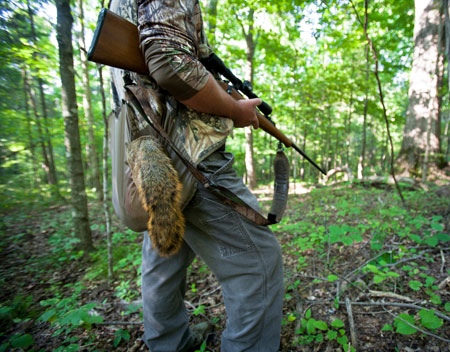BY Kevin Kelly
Fall doesn’t officially start for another two months but in one respect it’s already upon us.
The 2016-17 Kentucky Hunting and Trapping Guide has shipped to license vendors across the state and can be downloaded from the Kentucky Department of Fish and Wildlife Resources’ website at fw.ky.gov.

The 48-page guide lists season dates and summarizes regulations for deer, elk, bear, turkey, small game, furbearers and other species. It also provides information about licensing and permit requirements, youth hunting, quota hunts, public lands hunting and more. Changes from last season – such as the new deer zone assignments for Hardin, Webster and Marion counties – also are highlighted in the free guide.
The fall squirrel season leads off in a matter of weeks. This year, the split season opens Aug. 20 and continues through Nov. 11. It resumes Nov. 14 and runs through Feb. 28, 2017.
Squirrel hunting is a fantastic way to introduce new hunters to the sport, reconnect with woods and obtain an excellent source of protein.
A .410 or 20-gauge shotgun with a modified choke is difficult to beat early in the fall squirrel season when trees bear an abundance of foliage. A .22-caliber gun outfitted with a scope is preferred once the leaves start falling.
Good marksmanship starts with practice and public shooting ranges offer a controlled setting to safely sight-in your rifle. Rifle tube ranges are available on Curtis Gates Lloyd WMA in Grant County, Higginson Henry WMA in Union County, John A. Kleber WMA in Owen and Franklin counties, Jones-Keeney WMA in Caldwell County, Miller Welch-Central Kentucky WMA in Madison County, Otter Creek Outdoor Recreation Area in Meade County, Peabody WMA in Ohio, Hopkins and Muhlenberg counties and Taylorsville Lake WMA in Spencer, Anderson and Nelson counties.
Interactive maps of these public shooting ranges are available on the department’s website through the “Wildlife Management Area & Public Lands Search” feature or by clicking the “Maps” tab on the department’s homepage and selecting “Other Maps.” Public shooting ranges also are available on Daniel Boone National Forest.
Licensed hunters born on or after Jan. 1, 1975, also must successfully complete a hunter education course. Hunter education courses are offered in person, online or on a CD-ROM. Each option concludes with a live fire exercise at a range. Instructor-led courses will be in full swing from now through October and pre-registration through the department’s website is required. Hunters can receive a special one-year, one-time only exemption card if they cannot complete coursework by the start of a season.
The annual statewide mast survey is part of the lead-up to the fall hunting seasons.
Many species rely on hard mast for sustenance through the fall and winter months and the mast survey determines what percentage of hickory, red oak, white oak and American beech trees are bearing hard mast across the state. Conducted by Kentucky Fish and Wildlife and agency partners, survey work will begin soon.
“The few white oaks that I’ve looked at in the Bluegrass Region have looked good but that’s a small sample size,” said Ben Robinson, assistant Wildlife Division director with Kentucky Fish and Wildlife. “That’s why we do the mast survey. You might go out in your yard and have a white oak that’s loaded and think it’s going to be a great (mast) year, but when you pool all the trees together collectively across the state or at least region by region you start to see the value of doing multiple routes.”
Last year was poor for white oak acorns, which are preferred by deer, but about average for red oak and hickory and good for beechnuts. The spotty mast crop put deer on the move in search of food and aided hunters’ efforts. Deer hunters in Kentucky enjoyed a banner 2015-16 season, setting records at nearly every turn, including a new overall harvest record of more than 155,000 deer.
The archery deer season opens statewide on Sept. 3. Before then, biologists with Kentucky Fish and Wildlife will be conducting herd health assessments on three wildlife management areas and also Land Between The Lakes.
“I would expect another fine deer season,” said David Yancy, deer biologist with Kentucky Fish and Wildlife. “There’s nothing that portends a letdown.”
The kids are going back to school, or getting ready to soon. Days are growing shorter. Anticipation is building for the fall hunting seasons in Kentucky. They’ll be here before we know it.
Author Kevin Kelly is a staff writer for Kentucky Afield magazine, the official publication of the Kentucky Department of Fish and Wildlife Resources. Get the latest from Kevin and the entire Kentucky Afield staff by following them on Twitter: @kyafield.


Be the first to comment